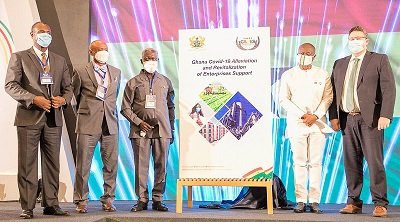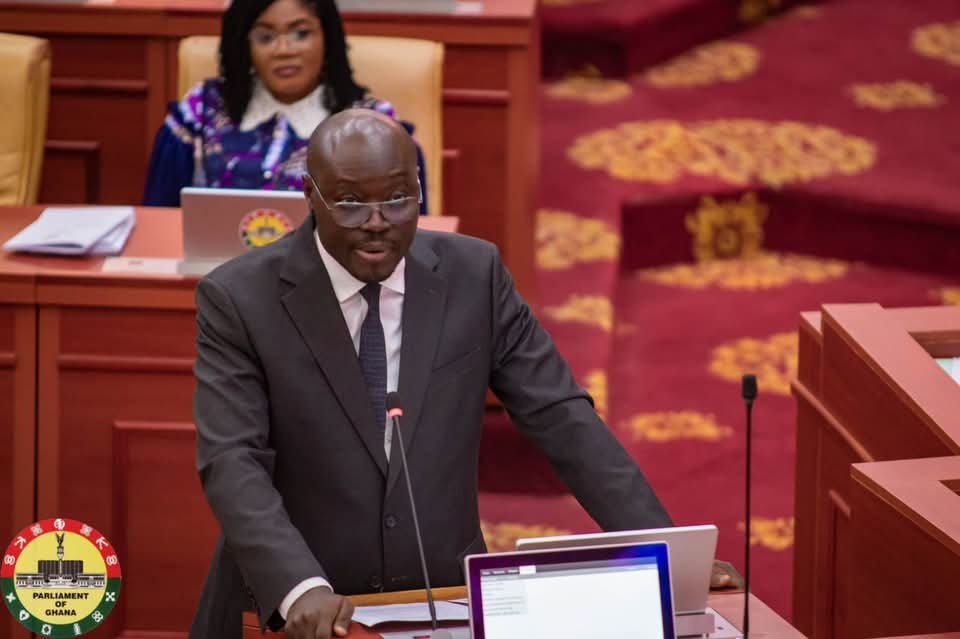Bussiness
Beneficiaries of Ghana CARES must use financial support judiciously

Businesses in Ghana prior to the year 2019 portrayed good times in view of the growth of the economy and macroeconomic stability the country had achieved the previous year following reforms by the government to tame rising inflation, interest rates and the budget deficit.
Remarkably, the country’s growth rate which stood at 3.7 per cent in 2016, had rebounded to 8.1 per cent in 2017 and tumbled a little to 6.3 per cent in 2018 with interest rate also down trending.
But the hopes of the private sector business operators were soon dashed following the outbreak of Corona Virus Disease (COVID) in 2019, crushing all the macroeconomic stability and growth gains the country had achieved.
Inarguably, the coronavirus pandemic, which started in Wuhan in China in 2019, has had a serious bite on the global economy in general and the Ghanaian economy in particular.
What started as health crisis from China, quickly transformed into a global economic crisis, putting the Ghanaian economy in a difficult situation and bringing some businesses on their knees.
Almost all the countries in the world have had a ‘taste’ of the coronavirus disease.
Worryingly, the pandemic affected global financing conditions, squeezing credit support to the private sector, shifting government and the financial sector credit support to the health sector.
This is understandably so because governments needed to procure the necessary sanitation and health supplies such as sanitisers, nose and facemasks, to contain the spread of the virus and save lives.
Commendably, the Ghana Government bore the cost of testing, isolation and treatment of people infected by the virus.
The findings of the June 2021 Credit Conditions Survey conducted by the Bank of Ghana (BoG) revealed that there was a net ease in overall credit stance on loans to enterprises.
It said banks had projected the net ease in overall credit stance on loans to enterprises to continue for the next two months.
“This still reflects the significant loan repayment challenges that SMEs have faced since the onset of the COVID-19 pandemic based on which banks may want to maintain a net tightened stance towards that segment of the market to preserve their asset quality,” the report said.
A recent Ghana Business Tracker Survey conducted by the Ghana Statistical Service in collaboration with United National Development Programme and the World Bank, to assess the impact of COVID-19 on the private sector, said “The shock caused by the COVID-19 pandemic has had considerable impacts on Ghanaian firms.”
The study revealed that the partial lockdown introduced by the government to control the movement of people restricted economic activities in Greater Accra and Greater Kumasi.
“The partial lockdown forced many businesses to close, while even those firms not affected by the lockdown measures found themselves with fewer customers and orders. Firms also had increased difficulties in sourcing inputs and found it difficult to cover revenue shortfalls,” the study, said.
It said 35.7 per cent of business establishments had to close during the partial lockdown, with 16.1 per cent continuing to be closed after the easing of the lockdown, with firms in the accommodation and food sector being the most affected (24.0 per cent had to close).
The impact of the COVID-19 on the economy and businesses encouraged the BoG to pursue accommodate monetary policy stance to make cost of credit cheap for businesses and spur the growth of the economy.
Consequently, the BoG cut the Monetary Policy Rate by 150 basis points from 16 per cent in January 2020 to 14.5 per cent in March 2020.
It was maintained at 14.5 per cent from March 2020 to March 2021 and subsequently cut by 100 basis points at 14.5 per cent in March 2021 to 13.5 per cent in May 2021 and maintained at 13.5 per cent in July 2021.
The US Government, for instance, pursued a quantitative easing programme following the outbreak of the disease to pump about $3.5 trillion into the American economy to support the economy and businesses affected by the disease.
Similarly, the Ghanaian government increased its spending to contain the spread of the virus, save lives and prop up the economy.
The government introduced also a number of programmes to support the private sector overcome the challenges posed by the coronavirus pandemic.
One of such initiatives is the COVID-19 Alleviation and Revitalisation of Enterprise Support programme dubbed Ghana CARES Obaatanpa Programme.
Launched in November 2020, the Ghana CARES programme is an unprecedented, bold and audacious GH¢100 billion post COVID programme to stabilise, revitalise and transform Ghana’s economy to create jobs and prosperity for Ghanaians over a three-year period.
It is sequenced in two phases: a Stabilisation Phase that is running from July to the end of the year (2020); and a medium-term Revitalisation Phase from 2021-2023.
The government said, 70 per cent of the funding for the programme would come from state, while the remaining 30 per cent would also come from the private sector.
The Finance Ministry, under the COVID-19 Alleviation and Revitalisation Enterprises Support, is reported to have allocated an amount of GH¢282 million to the Trade and Industry Ministry to disburse to businesses.
According to the Deputy Trade and Industry Minister, Mr Herbert Krapa, who broke the news at the Spark Up summit held in Accra on Tuesday, September 7, 2021, said the move was to revive the trade and industry sector which had been badly hit by the pandemic.
Beneficiaries of the Ghana CARES programme must use the financial resources allocated to them judiciously to turn around their businesses.
Businesses that would access the Ghana CARES funds must not treat the funds as a consumption item and spend in recurrent expenditure such as paying of salaries.
It would be in the interest of the beneficiaries to invest the funds in the core operations of their businesses to generate better returns and pay back the money for other businesses to also benefit.
In this period, when credit is difficult to come by, it would not be an exaggeration to state that, the Ghana CARES programme has come in handy, and must be harnessed by the beneficiaries to turn around their businesses.
While at it, this column will commend the government for initiating the Ghana CARES programme to help prop up the economy and revamp private sector businesses, which had been seriously impacted by the COVID-19 pandemic.
Writer’s email: gbetomenyo81@gmail.com
(0246943864)
By Kingsley Asare
Bussiness
Ghana to host mining and minerals convention 2025 to shape future of gold industry

Ghana’s gold and minerals sector is set for a major spotlight as Meetings. Co, in partnership with key industry stakeholders, announces the Mining & Minerals Convention 2025, scheduled from August 26-27, 2025, at the Kempinski Hotel Gold Coast City, Accra.
Held under the theme “Shaping the Future of Ghana’s Gold Industry,”‘ the Convention will convene government leaders, regulators, miners, refiners, investors, sustainability partners, innovators, and responsible mining, and global competitiveness,policy experts to explore strategies that position Ghana’s gold industry for long-term growth.
The two-day convention will feature presidential and ministerial keynote addresses, industry thought leadership, technical paper presentations, policy dialogues, fireside chats, exhibitions, and high-level networking sessions.
Convention delegates can anticipate a dynamic and insightful experience, marked by thought leadership from leading policymakers and regulators, in-depth discussions on key topics such as sustainability, ESG, digital gold, and responsible sourcing, as well as valuable opportunities to forge public-private partnerships and investment deals.
Moreover, the event will offer practical action points aimed at unlocking greater economic value for Ghana.
The 2025 edition will be supported by a strong coalition of strategic partners, including the Ministry of Lands and Natural Resources, the Minerals Commission, GoldBod, the Minerals Income and Investment Fund (MIIF), and the Ghana Extractive Industries Transparency Initiative (GHEITI).
Bussiness
Finance Minister tranfers funds to DACF, NHIS and GETFUND

The Minister for Finance Hon. Cassiel Ato Forson has disclosed that a sum of nine hundred and Eighty-Seven Million, Nine Hundred and Sixty-Five thousand and Seventy-Three Ghana Cedis (GHS987,965,073.00) from the Consolidated Fund into the District Assembly Common Fund Account, being the first quarter amount due to the DACF.
Furthermore, the Finance Minister informed the House that a total amount of Two Billion, Thirty- Three Million, Four Hundred and Sixty-Nine Thousand, Six Hundred and Seven Ghana Cedis (GHS2,033,469,607) has been disbursed to the National Health Insurance Fund.
While the Ghana Education Trust Fund has also received a total of Two Billion, Seven and Ten Million, Two Hundred and Twenty-Seven Ghana Cedis (GHS2,710,227,947.00) for the months January, February, March and April,2025.
The Finance Minister disclosed this in his statement to Parliament on the payments to statutory funds on the floor of the House.
In addition, he cautioned that the Administrator of the District Assembly Common Fund is required to ensure that 80% of this amount is transferred directly to the Assemblies without fail and expenditure returns submitted to the Ministry of Finance before subsequent releases will be made.
He added that Members are encouraged to monitor the utilization of these amounts sent to their respective Assemblies in line with the approved guidelines by Cabinet.
In his closing remark, Ato Forson said he’s going to take the concerns of the House seriously.
For his part, the Majority Leader, Mahama Ayariga made known the President’s prioritization of women in the country stating that President Mahama is “Pro-women”.
This is due to the fact that women are going to be the core beneficiaries from the expenditures going to be made by the MMDA’s, he added.
The Minority Leader Alexander Afenyo-Markin questioned the Finance Minister why road contractors have not been paid for more than five months. He said the Minister must not be applauded for since the allocation of these funds were long overdue.






